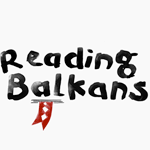Marko Tomaš, born 1978 in Ljubljana, was one of the founders and editors of the Kolaps literary magazine in Sarajevo. He has worked as a journalist and radio speaker and has published extensively across the region. He is a poet of a rare sensuality and emotional refinement with a rarefied bohemian touch reminiscent somewhat of a young Leonard Cohen. His published works include, Hands Under Head (2002), Mama I’m Successful (2004), Life Is a Joke (2005), Marko Tomaš and Other Poems (2007), Goodbye Fascists (2009), Midnight Conversations (with Mehmed Begić) (2012), Boulevard of the People’s Revolution (2013), The Black Prayer Book (2015), The Paper Boat Race (2016), Thirty-Ninth of May (2018).
Selected Poems
When I Return From War
Try This, Dear Wagner
My People
My people are scattered in distant cities.
My people wake up in Saigon and Managua.
They drink in bars in Zagreb and on those parapets in Split.
They get wasted on speed in Sarajevo nights.
They drive their kids to school on the streets of Vienna.
They hallucinate underneath the Berlin sky.
They hurry to work in Paris.
They play banjo in the bars of Edinburgh.
They practise yoga in Sombor.
They urinate in the entrances of buildings in Belgrade.
They make love on Bosporus.
They tell juicy jokes in the gardens of Mostar.
They wash dishes in the Copenhagen restaurants.
They are looking for a sunny spot in Oslo.
Homeless orphans, much like those Dickens’s boys and girls.
My people – I say.
Ghetto
It’s still here, the mean bank of the river.
That’s where I grew up.
Raised by my grandma and my grandpa.
My whole childhood I listened to horrible stories.
That taught me respect.
Those stories and terror I used to feel
walking down the street.
Sometimes I would hear distant echoes
of some pointless desperate battle,
would sense the stench
that flame-throwers leave behind.
And only the smell of wet dough
in my grandma’s kitchen
would bring me back to reality
that each time looked more and more yellow
like that Mitteleuropean sky.
In fact those young Israeli pilgrims
are really horrible.
They stumble in drunken rage over that place with so much sadness.
The sadness I haven’t been able to shake off my whole life.
My girlfriends, the stewardesses, all tell me
that the worst flights to work on
are those from Tel Aviv to Warsaw.
You hear no kaddish, just burping and drunken cussing.
Oh, those Israeli youth in the Zamenhof Street
always used to creep me out.
Every time after they would depart,
leaving behind the smell of alcohol,
heaps of paper waste and cigarette buts,
I would just like in my childhood
hear the distant echoes
of some pointless desperate battle.
A Little Man In a Little Town
Little men in little towns are obsessed
with their own stature.
The same goes for me, I’m looking for a perfect
little spot for all these little words
in order to electrify my homeland.
But this search for the homeland will someday
be the death of me.
Tom Waits hates me
whenever I try to write
like American poets.
For this little history little words
that can bypass each other on a narrow road
should suffice.
Not to mention that try as I might
I could never be able to get rid of the heavy Slavic accent.
In a little town everything is a little toned down.
For example, street-lights are never strong enough
to light up this entire prosaic fresco,
as they can barely embrace a young couple
having a fight, or that linden
to whose smell I have always been allergic
to the extent that it makes me really hate
this little town spring.
I would like – like other little men in big cities –
to really mind my own business, but I am too bloodthirsty,
plus the little parks in my little town have indeed turned
into little cemeteries and I never fail
to rub that fact into everyone’s nose, because
the glorious war merits of us little people
are just enormous.
Nobody wants us – little people – for his enemy!
Our condescension, our haughtiness, our haughty-naughty-haughtiness
will always defeat every decent word.
For we are little people,
we are arrogant people,
we are not-entirely-fulfilled-people.
Walking across this wasted land.
Morning in Mahallah1
Translated by Damir Šodan

